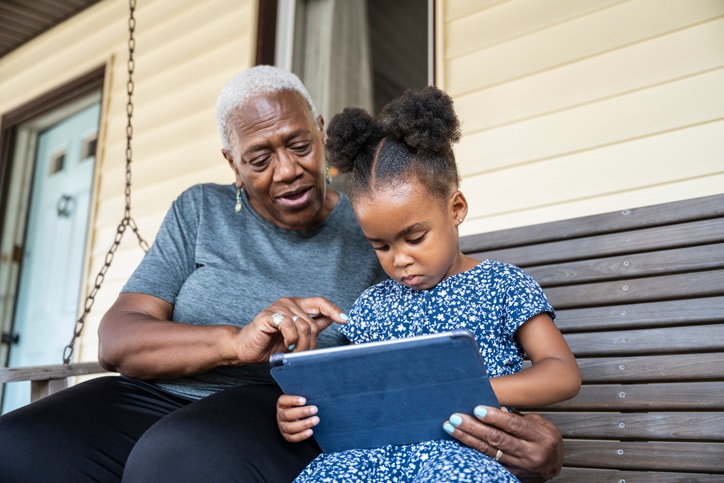In this article
There’s a good chance the screen time rules you have for your child are different from the screen time rules grandma and grandpa invoke (if they have any rules at all). On the one hand, modern parents are much more knowledgeable about the effects of screens (iPads weren’t a thing in the 80s and 90s). On the other, grandparents, in most cases, are providing free child care — why shouldn’t they get a break in the form of YouTube or a Nintendo Switch? It’s tricky.
“As both a therapist and a mom of a 14-year-old boy, I understand that screen time can feel like the third parent in the room, especially when grandparents are involved,” notes Samantha Silverman, licensed clinical social worker and CEO of Silver Linings Mental Health in Denver. “Grandparents like to indulge, parents like structure. Finding balance between the two takes compassion, clarity and consistent communication.”
Whether you want to know how to tackle this topic before it becomes an issue, or you feel like you need to rein your child’s screen time in at grandma’s, check out these expert tips for handling this difficult situation.
Key takeaways
- Screen time rules can be a major source of tension between parents and grandparents. Traditionally, grandparents like to indulge their grandkids, which can be at odds with modern parents’ desire for screen limits.
- A good rule of thumb for screen time is ‘occasional use, not all-day access. But parents need to remember that this can add an extra task for grandparents, and they may not have all the parental controls set at their house.
- Setting simple, flexible boundaries (“no screens during meals,” “occasional use, not all-day access”) and focusing on shared goals, like creating meaningful memories, helps everyone stay connected and on the same page.
- If grandparents struggle with screen time rules, try sending the kids to their grandparents with fewer personal devices or planning screen-free activities in advance. Don’t forget to communicate clearly with both kids and grandparents about your expectations.
What screen time rules should kids have with grandparents?
Rare is the grandparent who follows anything and everything mom and dad say to the tee. They’re grandparents, remember? In addition to providing free child care, “overindulgence is their love language,” notes Silver.
Put another way: You’re going to have to be flexible. However, it shouldn’t be a complete free-for-all.
“A good rule of thumb is ‘occasional use, not all-day access. But parents need to remember that this can add an extra task for grandparents, and they may not have all the parental controls set at their house.”
—Tessa Stuckey, licensed professional counselor
“It’s OK for things to look a little different at the grandparents’ house — after all, that’s part of the fun of being with them,” says Tessa Stuckey, a licensed professional counselor and parenting coach in The Woodlands, Texas. “But different doesn’t have to mean ‘no rules whatsoever.’”
“A good rule of thumb is ‘occasional use, not all-day access,’” Stuckey continues. “But parents need to remember that this can add an extra task for grandparents, and they may not have all the parental controls set at their house.”
It’s also helpful to think of screen time at grandma and grandpa’s house in broader terms. So, instead of saying the kids “have to get off devices after two hours,” Stuckey recommends making suggestions like “no screens before bed; no devices during meals and activities and take breaks.”
And most importantly, Stuckey adds, remind grandparents that their role is incredibly special. “This is their chance to create meaningful, lasting memories,” says Stuckey. “Baking together, playing cards, telling stories, going for walks. A little screen time can be part of the visit, but it shouldn’t be the visit.”
Read more:
How do you set screen time rules with grandparents?
Your best course of action is to bring screen time limitations up before it becomes an issue. By doing this, Stuckey notes, it feels like a collaboration.
“Parents should approach the conversation from a place of teamwork, not control,” she says. “Instead of handing over a list of rules, try saying something like, ‘We’ve worked hard to create some healthy screen habits at home, and we’d love your help keeping things consistent when the kids are with you.’”
This frames it as partnership, not criticism, she explains. It also helps to be clear and share what’s working for your family. “Grandparents aren’t mind readers,” Stuckey says. “You can say something like: ‘We usually limit personal devices to 30 minutes a day,’ or ‘We keep screens off during meals and family time.’”
How do you talk about screen time rules with grandparents?
Whether you brought the topic up on the front end or find yourself in need of a conversation after your son watched five hours of Steal a Brainrot Roblox videos on YouTube (#iykyk), here are a few tips for a smooth conversation.
1. Start soft
Don’t go in guns blazing. Open up the conversation with appreciation and acknowledge that you love how your parents love spending time with your kids, says Stuckey. After that, you can discuss how technology has changed since they raised children.
“They weren’t navigating constant connectivity, social media pressures or online risks when you were growing up, so sometimes they don’t fully grasp why these boundaries matter as much as they do today,” notes Stuckey.
“Gently explaining the why behind your screen guidelines can help them see that this isn’t about being rigid — it’s about protecting kids and preserving quality time,” she adds.
By doing this, you’re sharing the reasoning behind the rules — the well-being of your child — which can make grandparents more receptive to boundaries.
2. Keep it simple
Don’t make the conversation long and meandering. “Instead of overwhelming them with a long list of dos and don’ts, focus on a few key boundaries,” Stuckey says. “This may be ‘no screens during meals, a set amount of personal device time, or saving movies for the evening.’ This makes it easier for them to remember and follow through.”
3. Make it a team effort
It can also help to involve them in the conversation, rather than just telling them what to do, Silverman says, noting that it’s important to ask for their thoughts and involve them in the decisions.
“When you frame it as a shared goal rather than a rule to enforce, grandparents are more likely to respond positively,” she says.
“Grandparents love their grandkids, and most of the time, if they push back, it’s coming from a place of not fully understanding why the boundary matters, not from trying to undermine you.”
—Tessa Stuckey
4. Offer alternatives
It’s been some time since your parents had little kids, so make sure they have boredom-busting ideas in their back pocket, notes Silverman. “Offer alternatives that make time together enjoyable such as baking, board games or looking through old photos,” she says. “Keep the tone light and conversational and remember that humor can go a long way in easing potential tension.”
5. Keep it about the kids
Finally, be sure to frame your boundaries as protecting their relationship with the grandkids (as well as keeping the kids safe and regulated). “Remind them that these boundaries aren’t about rules for rules’ sake — they’re about helping their time together be more meaningful and connected,” Stuckley says. “That usually softens the conversation and brings everyone onto the same page.”
What if grandparents disagree on screen rules?
Push back is common, Stuckey notes, but it doesn’t have to turn into a big conflict. “Grandparents love their grandkids, and most of the time, if they push back, it’s coming from a place of not fully understanding why the boundary matters, not from trying to undermine you,” she says.
Knowing this can help you stay calm and keep the focus on the kids. Stucky suggests saying something like: “We’re trying to protect their developing brains, their emotional health and keep that family time really meaningful — so these screen limits aren’t random rules, they’re intentional.”
And if they still don’t agree, it’s OK to stand firm in a kind way. “You can say: ‘I know it’s tricky, but when we stretch the limits too much, it’s harder for them to get back on track at home. Can we find a middle ground that works for everyone?’” notes Silverman.
What should I do if grandparents don’t follow our screen rules?
If grandma or grandpa slip up once or twice, Stuckey recommends leading with grace, not guilt. She recommends offering a gentle reminder after the visit, like “Hey, remember how we’re trying to limit personal device time? Let’s make sure we stick to that next time.”
If things still don’t change, Stuckey suggests sending the kids with fewer personal devices (if they’re going to their grandparents’ house) or planning screen-free activities in advance.
And if the kids are old enough, put some of the onus on them, as well. Silverman suggests talking to them about screen expectations beforehand. Remind them to respect their grandparents and their house rules, to prioritize quality time together and maybe even choose to leave their personal devices behind for this visit,” she says. “That conversation sets the tone and empowers your kids to be part of the solution, not just the rule followers.”





